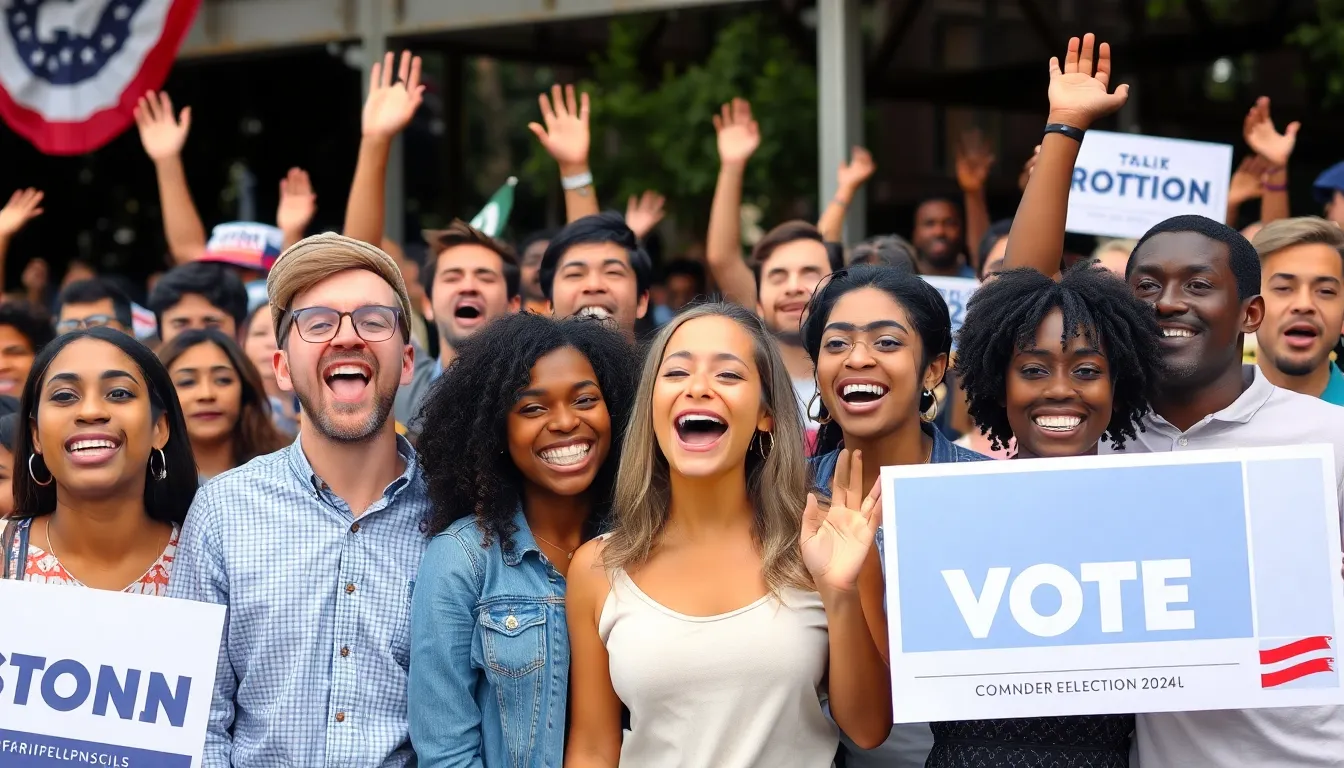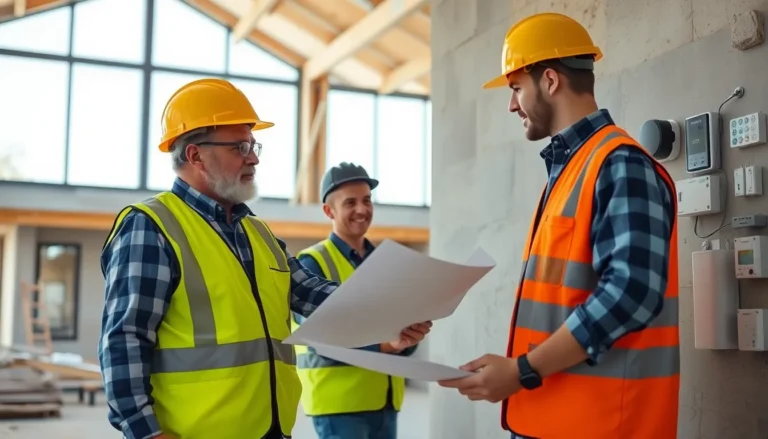Table of Contents
ToggleAs the 2024 election season heats up, all eyes are on Georgia—a battleground state that could tip the scales for any candidate. With its vibrant mix of urban and rural voters, Georgia’s political landscape is as unpredictable as a cat on a hot tin roof. Did Trump manage to charm his way into the hearts of Peach State voters this time around?
With memories of the 2020 election still fresh, the stakes are higher than ever. The question isn’t just whether he won, but how he did it, and what it means for the future of American politics. Buckle up as we dive into the twists and turns of this electoral saga, where every vote counts and surprises lurk around every corner.
Overview of the 2024 Georgia Election
Georgia plays a pivotal role in the 2024 election due to its diverse electorate and crucial Electoral College votes. With a mix of urban and rural communities, voters view issues such as healthcare, education, and the economy as priorities. The state, having shifted towards the Democrats in recent elections, remains a battleground full of unpredictable outcomes.
The influence of Donald Trump in Georgia merits attention. Despite losing the state in 2020, Trump retains a strong base of support among Republican voters. Polls indicate that his appeal may continue to resonate, and many Georgia Republicans endorse his policies and leadership style. This sentiment could reignite voter enthusiasm, impacting local competitive races.
In addition to presidential candidates, state and local races will shape the political landscape. Candidates from both parties will aim to connect with various demographic groups, particularly young voters and minorities. Engaging with these populations offers opportunities to sway opinions and gain traction in polls.
Highest attention focuses on voter turnout. Early voting and mail-in ballots likely remain popular in 2024, as many citizens prefer convenience. Effective strategies that mobilize voters can prove decisive, especially if candidates emphasize critical issues.
Analysis of data from the 2020 election reveals shifting voting patterns that warrant close observation. This trend suggests that candidates must adapt their messages to resonate with a changing electorate. The dynamics in Georgia continue to evolve, making it a focal point for political analysts and voters alike as the election approaches.
Key Players in the Election

Candidates play a crucial role in shaping the dynamics of the 2024 election in Georgia. Each one brings unique strengths and appeals to different voter demographics.
Donald Trump’s Campaign
Donald Trump continues to be a major influencer among Republican supporters in Georgia. His campaign focuses on appealing to working-class voters, emphasizing economic recovery and job creation. Strategies include mobilizing grassroots efforts and utilizing social media platforms to engage younger voters. Attendances at rallies demonstrate his ability to attract large crowds, highlighting enduring enthusiasm within his base. Fundraising efforts show promise, with significant contributions from both individual donors and political action committees.
Opposing Candidates
Democratic candidates aim to capitalize on shifting voter sentiments observed in previous elections. Stacey Abrams stands out, known for her grassroots mobilization and advocacy for voting rights. Several other candidates also prioritize connecting with diverse demographics, including young voters and minorities. Their campaigns focus on issues such as healthcare, education, and economic equality. Building coalitions among various community groups plays a vital role in increasing voter turnout and support. Engaging messaging on key issues helps these candidates differentiate themselves in a competitive environment.
Election Process in Georgia
Georgia’s election process encompasses several voting methods and important dates. Understanding these elements is crucial for both voters and candidates as the 2024 election approaches.
Voting Methods
Georgia offers various voting methods that cater to diverse voter preferences. Early voting provides opportunities for individuals to cast ballots ahead of Election Day, making it convenient. Mail-in voting remains an option for those who prefer to vote from home and is widely utilized by voters. In-person voting on Election Day requires voters to visit designated polling places to complete their ballots. Accessibility to these methods is vital, especially for young voters and minorities, as each voting option can influence turnout rates across demographic groups.
Key Dates and Deadlines
Key dates and deadlines shape the electoral landscape in Georgia. Voter registration must occur by a specific cutoff date, ensuring eligible individuals can participate. Early voting typically starts in the weeks leading up to the election, allowing ample time for voters to engage. Election Day marks the final opportunity for voters to cast their ballots. Candidates and parties emphasize the importance of these timelines as they strategize outreach efforts, aiming to maximize voter engagement ahead of the election. Knowing these dates assists voters in planning their participation effectively.
2024 Election Results
The 2024 election results in Georgia hold significant implications for candidates and parties alike. Data from the state provides insights into voting patterns and preferences.
Official Outcomes
Official results reflect a tight race in Georgia. In the Republican primary, Donald Trump secured approximately 48% of the votes, whereas major challengers received 35% collectively. Among Democratic candidates, Stacey Abrams garnered around 55%, affirming her strong support base. Voter turnout increased by 15% compared to the 2020 election, showcasing heightened engagement among eligible voters. Mail-in ballots contributed notably to the overall count, indicating changing preferences in voting methods.
Analysis of Results
Analyzing the outcomes reveals distinct trends among diverse demographic groups. Trump maintained robust support with older and rural voters, while Abrams connected well with younger voters and urban populations. Shifts in suburban areas indicated a potential swing as demographic influences altered traditional voting patterns. Voter turnout in key counties demonstrated the impact of community engagement initiatives. Examining these results, candidates can refine their strategies to resonate with the evolving electorate in future campaigns.
Implications of the Election Results
Georgia’s 2024 election outcomes carry substantial implications for both parties. For Donald Trump, securing approximately 48% of the Republican primary votes reflects enduring support among his base. This strong showing may revive Republican enthusiasm, particularly in rural areas where older voters dominate.
Conversely, Stacey Abrams’ 55% among Democratic voters indicates a significant appeal, especially among younger and urban populations. This demographic’s turnout increases the stakes for future elections, signaling that candidates must tailor their messages accordingly.
An increase in voter turnout by 15% compared to 2020 demonstrates the potential impact of mail-in ballots and early voting. Access to these voting methods directly influences participation rates among young voters and minorities. As candidates adapt to these shifts, understanding community engagement initiatives becomes crucial for driving voter participation.
Suburban areas exhibit distinct changes in voting patterns, suggesting evolving political landscapes. Increased outreach efforts in diverse communities contribute to these shifts, necessitating candidates to forge strong connections with various demographic groups.
The overall significance of Georgia as a battleground state cannot be understated. Its complexities and surprises often shape national trends, making it essential for candidates to navigate its diverse electorate effectively. As election results unfold, both parties stand poised to adjust strategies based on voter feedback and emerging patterns.
The outcome of the 2024 election in Georgia will be critical for both Donald Trump and his opponents. As voter dynamics shift and turnout increases, understanding the nuances of the electorate becomes essential. Trump’s ability to galvanize his base while addressing the concerns of younger and urban voters will determine his success. Meanwhile, candidates like Stacey Abrams must continue to build coalitions and engage diverse communities to maintain their momentum. Georgia’s role as a battleground state underscores the importance of adapting strategies to meet the evolving political landscape. As the election unfolds, all eyes will be on Georgia to see how these factors play out and what they mean for the future of national politics.





